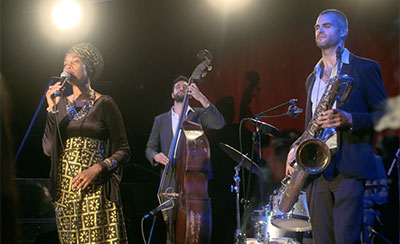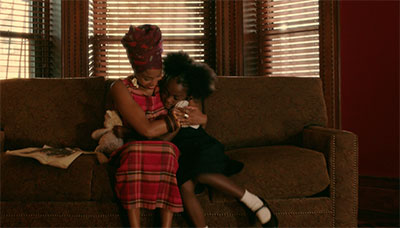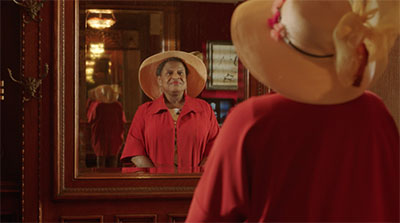
Triple Your Impact This Holiday Season
Triple Your Impact This Holiday Season
Celebrate the holidays with a year-end gift that can go 3x as far to help provide care and support to the millions affected by Alzheimer's disease, and to advance critical research. But please hurry — this 3x Match Challenge ends soon.
Donate NowAward-Winning Short Film “Baby Won’t You Please Come Home” Focuses on Alzheimer’s Disease
The opening of the film shows the power of Pearl as a young jazz singer. Why was it important to show Pearl’s memories interspersed with her present-day life?
Chris: One of the things that struck me about Alzheimer’s disease is that some people with the disease can be in the past in their minds, then quickly snap back into the present. This can be both disorienting and confusing. I wanted to tell a story from the point of view of the person with the disease, showing how memories sometimes get scrambled in the back and forth. This film was my attempt at showing how frightening this disease is for the person living it.
 Tell us a little about the process of creating the film.
Tell us a little about the process of creating the film.Chris: When I wrote the script, I didn’t believe I could actually make it into a film. Thankfully, the pieces all lined up, including finding an empty house in Park Slope (in Brooklyn) to film in! The house is like a character on its own, given how important it is to Pearl, and is a metaphor for her mind: the memory of her husband and her youth still live there, and she is physically connected to all the happy times she had in this house. If someone took her away from her home, it would be akin to taking a piece of her life away.
Before embarking on this film, I spent a lot of time researching Alzheimer’s disease. I wanted to be sensitive to the realities of how Alzheimer’s is experienced by the person living with it, and how different each experience is. In Pearl’s case, she is losing touch with the present day and delving into her memories from decades earlier. I wanted to capture the emotional truths of that experience and what it can be like for a person living with dementia. Because of this, the actual shooting was intense for everyone involved: long hours, a packed schedule and emotions flying around.
You have a personal connection to Alzheimer’s, as do many of the cast and crew.
Chris: Yes. I do, and many of our actors and crew agreed to do this project based on their personal experiences with Alzheimer’s. It’s hard not to be emotional, filming scenes that play out like moments we have gone through in real life. It was both challenging and gratifying to explore these emotions.
The script is influenced by my personal experience with both of my maternal grandparents and my uncle. My uncle passed away several years ago from complications of Alzheimer’s. When I was growing up, he was a fun guy who always did funny impressions. I only knew this happy side of him. After he was diagnosed, I saw a different side. He didn’t want to accept help and he wanted to do everything himself. It was hard.
Both Melanie and Michelle have experience as caregivers. They were able to tackle roles from a personal place and it really shows in the film. Their performances are so raw and accurate. This is personal for many of us, and it’s important to us that our work is helping raise awareness of Alzheimer’s and dementia.
 Michelle and Melanie, how did you both get involved in the project, and why?
Michelle and Melanie, how did you both get involved in the project, and why?Michelle: Chris sent his script to my agent’s office. It was only 18 pages, but it was so impactful. I thought that this might be a good adventure for me to go on, but first I called Chris with three crucial questions. I asked him where he was from, why the subject of Alzheimer’s and why he wanted me to play this part. He said all the right stuff and it hit me on a personal level. Knowing he had personal experience with the disease was key.
Melanie: Because of my personal connection, I was immediately intrigued by the material. I loved that the story was told from the point of view of the person with the disease. You actually go on this journey with the person, and it was so fresh and intriguing. It was an honor to be offered the role, and when I found out that Michelle would be playing my mother, that was the selling point.
 Tell us about your caregiving experiences.
Tell us about your caregiving experiences.Melanie: Alzheimer's runs in my family. Most of my great uncles and aunts battled the disease before they passed. Today, I only have two great uncles left and one has Alzheimer’s.
My grandmother, who lived in Trinidad, was the matriarch of our family, and the coolest chick ever. She would take us to Carnival and was just a blast to spend time with. She had a huge personality.
Later in life, she had cancer and then developed Alzheimer’s. It was really hard. She raised me until the age of 5 while my mother was creating a new life for us in Canada. After we moved to Toronto, I would come back to Trinidad during the summers. That is when I found out that Alzheimer’s can REALLY bring out your personality. My grandmother’s edit button was GONE. She had these zingers, saying whatever she was thinking, but then she began to spend a lot of time in bed and the zingers faded away. I watched this vibrant woman — a teacher and then principal of a school who was so intelligent, quick-witted and funny — become a shell of herself.
Michelle: There are a lot of ups and downs as a caregiver. You often have these funny moments of utter joy that are clobbered later on as a disease progresses. I took care of my grandmother for three years when she came to New York to live with me. You don’t know when or if the end is coming.
Melanie: People should know that they are not alone in feeling these feelings. “I love this person, but she is driving me crazy”, “I wish this wasn’t happening…” You’re not a bad person for having these thoughts. You’re just human.
 What was a particularly intense scene to film?
What was a particularly intense scene to film? Michelle: There is a scene where Pearl comes home after having been lost all day. A policeman brings her home and her daughter is frantic with questions: “Where were you? What did you do?” It was a confrontation, but one that wasn’t angry because there were no answers Pearl could give her daughter. We must have done that scene seven or eight times, and Melanie and I were both past the verge of tears.
Melanie: There were a great deal of visuals in Chris’s script that were unbelievably potent. Skips in time, the paranoia Alzheimer’s can create, looking back on your old life. There is a scene late in the film that I won’t spoil for anyone, but it was heartbreaking for me given my personal connection. Shooting the scene brought back all the memories of when I had a similar experience, and it was very impactful.
 What were the most rewarding moments?
What were the most rewarding moments?Melanie: The moment my character lies down in bed with her mother. Filming that scene, I felt all the love Michelle has for me and that Pearl has for her daughter. That moment was quieter, and more reflective.
A very rewarding part of the film has been conversations with the audience members after screenings. These were not conversations I was having before making this film. Very few people knew about my history with this disease. It felt very therapeutic. It was a reminder that it is okay to have conflicting feelings along with the love you have for the person with the disease. Chris does such a good job of conveying that in the film, and a lot of people related to that.
I am also so touched that Chris included the names of all the cast and crew’s loved ones affected by dementia in the film’s end credits, from our grandmothers and aunts to parents and cousins. As an audience member sees that connective tissue, it becomes a shared experience.
How would you encourage people to break the stigma still surrounding Alzheimer’s disease and seek help and support?
Chris: My advice is to be proactive. Recognize the 10 Signs and educate yourself about the disease as early as possible. Don't hesitate to have those emotional conversations and engage with the person with the disease. Tell your loved ones you love them and what they mean to you while they still understand.
Michelle: I encourage people to get involved in clinical trials. You have nothing to lose. There aren’t enough people taking advantage of the opportunities out there. I want people with the disease and caregivers to know that they aren't alone. There are books you can read, support groups you can join. Reach out and get the help you need today.
Melanie: I agree. Most people have access to technology. Caregivers can go to alz.org to search for support groups and local services in their area. It is important to come together with people with similar experiences so you can learn what helped.
Michelle: The whole journey with this film has been gratifying. I once had a teacher who used to say: “You go toward what scares you the most.” By making this film and sharing our personal and complicated experiences, we did just that.
After 14 film festivals over three continents and 17 awards and nominations, “Baby Won’t You Please Come Home” premiered on YouTube, courtesy of Omeleto, on September 9. Watch the film below.
{^youtubevideo|(width)425|(height)264|(rel)True|(url)https://www.youtube.com/watch?v=N_t0ODFap8o|(fs)True|(autoplay)False^}
